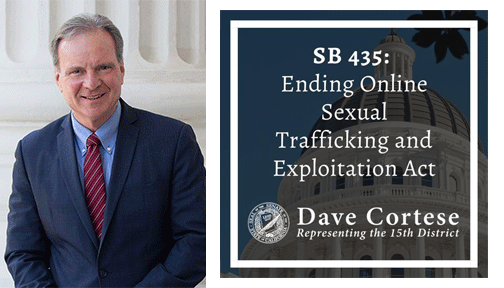Senator Dave Cortese (D-San Jose) has introduced SB 435, the “Ending Online Sexual Trafficking and Exploitation Act”, the first bill of its kind in the nation to tackle online sexual exploitation and trafficking, giving victims, including children, more civil causes of action against the distribution of naked or sexual photographs and video.
Nicholas Kristof, Opinion Columnist for The New York Times, recently profiled victims of child sexual abuse who were monetized and exploited through porn sites such as “Pornhub.” Pornhub, alone, is estimated to attract more than 3.5 billion visits each year and receives almost 3 billion advertisement impressions each day. Other porn sites with similar content aren’t far behind, with ad impressions totaling the hundreds of millions each day.
Content that is uploaded includes rape, child rape, “revenge pornography”, and other forms of sexual assault.
“In 2015,” Kristof detailed in his column, “The Children of Pornhub”, “6.5 were reported to the authorities in the United States; last year, the figure was 69 million.
“When a 15-year-old girl went missing in Florida, the girl’s mom found her on Pornhub, in 58 sex videos that the company was profiting from.”
The National Human Trafficking Resource Center (NHTRC) has determined that the largest majority of human trafficking cases reported nationally each year are in the state of California.
Senator Cortese, along with the California Women’s Law Center, local advocates and sexual assault survivors, is putting forward a bill in the California Legislature to end what he calls “human trafficking in the digital age.”
“Child sex trafficking is a major issue in our state, and the internet is its biggest platform,” says Senator Cortese. “SB 435 will dismantle a billion-dollar industry that is profiting off of child sexual abuse, sexual assault, and rape.
SB 435 would allow a victim of online sexual trafficking to bring a civil action for damages, including compensatory damages and punitive damages, against any person or entity that makes, obtains, uploads, reuploads or distributes in any form, including electronic distribution, non-consensual, sexually explicit content.
Actionable material includes content where a victim was under 18, content where a person of any age is coerced, tricked, or forced into performing a sexual act, and content that is sexual in nature and that is circulated in any way without a person’s knowledge or permission. This can include a photo or video that was originally taken in private with a person’s consent but was then shared and distributed across the internet without their consent.
Along with damages awarded to a victim, an offender must pay $100,000 for every 2 hours of online exposure of illegal content after given notice to take said content down. This amount is doubled to $200,000 for every 2 hours if the victim of online sexual exploitation is under 18 years of age.
Any online service that breaks this law would have to disclose this violation publicly on their website.
“This Bill is very thoughtfully put together, and if passed, will offer a powerful tool for victims of this terrible crime. Sharing nude images without consent is one of the cruelest forms of digital torture, and because this happened to Audrie and we know the pain it causes, we of course want to help anyone else who encounters this,” says Sheila Pott, founder of the Audrie Pott Foundation that was created in memory of her daughter, Audrie Pott, who was sexually assaulted, cyberbullied and committed suicide 8 days later.
“The anti-trafficking law proposed by Senator Cortese provides remedies to survivors of online sex trafficking that currently do not exist under California law. The cruelty and profit-motivated viciousness of an industry that preys on vulnerable victims, often women and girls, must be stopped. Online trafficking of their photos shatters their lives. This bill will give victims the help they need,” says Ruth Silver Taube, a Commissioner on the Santa Clara County Human Trafficking Commission and Supervising Attorney at the Katharine & George Alexander Community Law Center at the Santa Clara University School of Law.
The bill also targets repeat offenders, levying higher fines on those entities and online services that continue to circulate illegal content.
Former Assemblywoman and Executive Director of the California Women’s Law Center, Betsy Butler, calls this the first piece of legislation of its kind to give online sexual assault victims sufficient legal avenues to fight back against their perpetrators. The California Women’s Law Center is a sponsor of SB 435.
“This law, rooted in the California Women’s Law Center’s mission of seeking justice, will help prevent abuse and assist survivors of human trafficking rebuild their lives,” Butler says.
This bill is also being supported by the Coalition Against Trafficking in Women, Next Door Solutions to Domestic Violence, Community Solutions, and the Enough is Enough Voter Project.
Senator Cortese’s track record on combatting human trafficking includes the creation of the Anti-Human Trafficking Team as well as a $5 million annual reserve to prevent and treat victims of domestic violence, sexual assault, and human trafficking in Santa Clara County. In partnership with Professor Dauber, he recently spearheaded a first-of-its-kind audit of Title IX policies and procedures for Santa Clara County K-12 schools and colleges to address how schools handle allegations of sexual assault and harassment.

